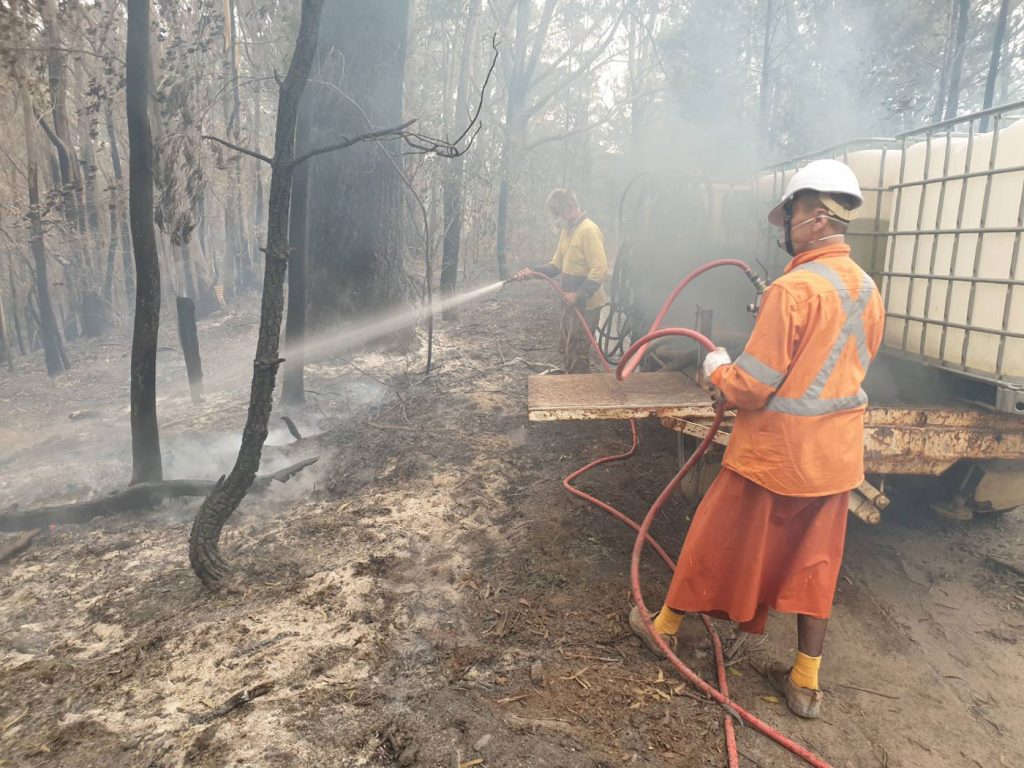Nothing is permanent, so everything is precious. Here’s a selection of some happenings—fleeting or otherwise—in the Buddhist world this week.
Bushfires Continue to Affect Buddhist Communities
In Australia, bushfires continue to threaten Buddhist centers. In recent weeks, Santi Forest Monastery in Bundanoon, New South Wales and Wat Buddha Dhamma, in Dharug National Park around 130 miles north, have suffered damage in the fires, which have devastated more than 6.3 million hectares of land. Now monks at Sunnataram Monastery, also in Bundanoon, have been evacuated, and while they pray for the least amount of damage possible, they are facing their losses with equanimity, according to Reuters. “Wildfires are normal in Australia’s bushland,” abbot Phra Mana said. “As long as our faith and morale remain strong, we are prepared to face it.”
The fire has burned a few of the monastery’s buildings and some water tanks, and Buddha statues remain standing across the property. Though the nearby forests still smolder, the monks—citing lessons on impermanence—do not despair. “We are prepared,” said Phra Mana. “At the same time, we accept.”
Bhutan to Debate Homosexuality Bill
Bhutan’s National Council, the upper house of parliament in the Himalayan Buddhist kingdom, will debate a bill that contains measures to decriminalize same-sex conduct. According to Asia-Pacific news magazine The Diplomat, a move to abolish two sections of the Penal Code of Bhutan that marked “unnatural sex” between consenting adults as illegal and a crime subject to punishment of up to one year in prison passed almost unanimously in the lower house of parliament in June 2019. If passed by the upper house this month, the bill will be sent to Bhutan’s king for final approval.The anti-homosexuality measures reflect legal provisions derived from the era of British colonialism, according to Amnesty International, which also suggested that the existence of these discriminatory laws exacerbates stigma against LGBTQI people, subjecting them to possible harassment and violence. The international human rights group called on Bhutan to seize this “historic opportunity” to repeal the sections.
Tashi Tsheten, director of LGBTQI group Rainbow Bhutan, told the Diplomat that Buddhism does not play a role in discrimination. “Our religion has so far never objected to the way we live our lives. Our gender identity and sexuality are linked to our past deeds or ‘karma’ of our previous lives,” he said. “We take that as an opportunity for acceptance as we believe we do not decide our fate and our lives are often determined by our deeds. This is why our religion teaches us to accept the way we are and not judge others for who they are.”
Korean Leader Gifts Beef Jerky to Buddhist Monks
It’s the thought that counts––er, the intention behind the action that matters––right? A South Korean leader accidentally sent beef jerky to monks at Korea’s largest Buddhist order, who practice vegetarianism. According to Yonhap News Agency, gift boxes containing dried meat from Liberty Korea Party (LKP) Chairman Hwang Kyo-ahn arrived at the headquarters of the Jogye Order of Korean Buddhism last week, due to a delivery error, said an unidentified LKP official. “Chairman Hwang had prepared beef jerky as this year’s Lunar New Year’s gift but selected a different one for the Buddhist community,” the official explained. “The jerky was not for the Jogye Order but was delivered erroneously. We apologized to the order while retrieving [the boxes that same day].” Chairman Hwang, who is running in Korea’s parliamentary elections this April, expressed his regret for the ritual blunder. “I feel very sorry for causing such anxiety to the Jogye Order,” Hwang told reporters on Monday. “I heard that there was a problem in the delivery process and we will try to figure it out thoroughly.”
This isn’t the first time that Hwang, who is a Protestant Christian, botched a Buddhist custom. Yonhap also reports that he incited controversy by not putting his palms together in the customary gesture at a Buddha’s Birthday ceremony last May. Following that incident, Hwang apologized for his lack of understanding of other religions.
A New Nalanda? Dalai Lama Shares Plans for Buddhist Studies University
His Holiness the 14th Dalai Lama shared plans of a new project for an academic institute of Buddhist studies in Bihar, India, according to Phayul.com. Speaking from his residence in Bodhgaya last week, the Tibetan leader described the university as a “second Nalanda institute,” referencing the 5th-century center of Buddhist learning where scholar-philosophers like Nagarjuna, Naropa, Dharmakirti, and others expatiated on emptiness and other concepts central to Mahayana schools of thought. The Dalai Lama stressed that the university will be a place to study Tibetan Buddhism in an academic context, but said that the new Nalanda will also contain a learning and research center for subjects like psychology, logic, and philosophy.
Congress Allocates Funds for Tibetans
The US Congress has sanctioned approximately $9 million to support Tibetan communities in India and Nepal as part of the Further Consolidated Appropriations Act of 2020. According to the Central Tibetan Administration, the bill allocates funds for programs that preserve and promote Tibetan language and cultural traditions, sustainable development, education, and environmental conservation in the Tibet Autonomous Region, Tibetan communities in China, and diaspora communities. The passing of this bill continues historical US support of programs that provide humanitarian aid, economic development, and educational assistance to Tibetans both in exile and in Tibet.
Thank you for subscribing to Tricycle! As a nonprofit, we depend on readers like you to keep Buddhist teachings and practices widely available.
